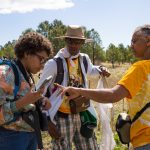Nominate for 2018 Ecological Society Awards and Fellows!
Calling all ESA members. Your Society Needs You!
To nominate your fellow ecologists for society awards and fellowships.
ESA depends on it’s community to put forward a strong pool of candidates representing the breadth and diversity of our field. We strongly encourage nomination of candidates from underrepresented institutions and minorities groups within the discipline.

2017 Cooper Award winner Trisalyn Nelson on the water in Sooke, British Columbia. Credit: Ian Walker
- 2018 Nominations Due: Thursday 19 October 2017
- Email Nominations to: awards@nullesa.org
ESA Awards
The Awards Committee of the Ecological Society of America solicits and encourages nominations from members of ESA for each of the awards listed below. ESA especially encourages nominations of candidates from traditionally underrepresented groups, including women and minorities.
Nomination process and schedule
Nominations for awards to authors for specific publications (George Mercer Award, W. S. Cooper Award, Sustainability Science Award) should include a letter of nomination with the full citation, and a copy of the publication (electronic if possible). Nominations for awards to an individual for a body of work (Eminent Ecologist Award, Odum Education Award, Honorary Member Award, Distinguished Service Citation) should include a curriculum vitae, a letter of nomination, and no more than three additional letters of support. Unless otherwise stated, nominees may be of any nationality or place of residence with priority given to ESA members.
To be given full consideration, nominations for awards should be completed by October 19, 2017 and submitted to awards@nullesa.org. We welcome nominations that reflect the diversity of the Society’s membership.
-

The Ecological Society of America’s 2017 Eminent Ecologist, Diana Wall. Credit: Martijn Vandegehuchte
The Eminent Ecologist Award is given to a senior ecologist in recognition of an outstanding body of ecological work or of sustained ecological contributions of extraordinary Recipients receive lifetime active membership in the Society. Recent recipients include Jane Lubchenco, Eric Pianka, Jerry Franklin, and Diana Wall.
- The Robert MacArthur Award is given to an established ecologist in mid-career for meritorious contributions to ecology, in the expectation of continued outstanding ecological research and who generally are within 20 year from PhD. This award is given in alternate years, and the recipient is invited to address the membership at the Annual Meeting following his/her selection. Recent recipients include Stephen W. Pacala, Anthony R. Ives, Mercedes Pascual, and Anurag Agrawal.
- The Eugene Odum Award recognizes an ecologist for outstanding work in ecology education. This award was generously endowed by, and named for, the distinguished ecologist Eugene P. Odum. Through teaching, outreach, and mentoring activities, recipients of this award have demonstrated their ability to relate basic ecological principles to human affairs. Nominations recognizing achievements in education at the university, K–12, and public levels are all encouraged. Recent recipients include Nathaniel Wheelwright, Bob Pohlad, Carolyn Thomas, and Kathleen Weathers.
- The Mercer Award is given for an outstanding ecological research paper published by a younger researcher (the lead author must be 40 years of age or younger at the time of publication). If the award is given for a paper with multiple authors, all authors will receive a plaque, and those 40 years of age or younger at the time of publication will share the monetary Nomination letters should include the birth date(s) of the eligible author(s) and explain the novelty and importance of the paper. The paper must have been published in 2016 or 2017 to be eligible for this year’s award. Recent recipients include Douglas Rasher, Marcelo Ardón, Jennifer Gremer, and Jennifer Williams.
- The S. Cooper Award is given to honor an outstanding contributor to the fields of geobotany and/or physiographic ecology, the fields in which W. S. Cooper worked. This award is for a single contribution in a scientific publication (single or multiple authored). Recent recipients include Scott Wing and colleagues, Carissa Brown and Mark Vellend, Etienne Laliberté and colleagues, and Andrew Trant and colleagues.
- The Distinguished Service Citation is given to recognize long and distinguished volunteer service to the ESA, to the larger scientific community, and to the larger purpose of ecology in the public Recent recipients are Wes Jackson, Alan Covich, Carol Brewer, and Debra Peters.
- Honorary Membership in the Society is given to a distinguished ecologist who has made exceptional contributions to ecology and whose principal residence and site of ecological research are outside of North America. Up to three awards may be made in any one year until a total of 20 is reached. Nominations of women and minority candidates, as well as those from developing countries, are especially encouraged. Recent honorees include Richard Shine, Christian Kӧrner, Stuart Bunn, and Richard Hobbs. The Honorary Member Award is not open in 2018.
- The Sustainability Science Award is given to the authors of a scholarly work that makes the greatest contribution to the emerging science of ecosystem and regional sustainability through the integration of ecological and social sciences. One of the most pressing challenges facing humanity is the sustainability of important ecological, social, and cultural processes in the face of changes in the forces that shape ecosystems and regions. This ESA award is for a single scholarly contribution (book, book chapter, or peer-reviewed journal article) published in the last five years. Recent recipients are Pamela Matson, Fikret Berkes, Margaret Palmer and J.B. Ruhl, and Jianguo Liu and colleagues.
- The Innovation in Sustainability Science Award is given to the authors of a peer-review paper published in the past five years that exemplifies leading-edge work on solution pathways to sustainability challenges. The award recognizes that the application of sustainability science is enabled by linking ecological science with advances in other biophysical disciplines, engineering, the social sciences (e.g., economics, anthropology, public policy, governance), and other fields. The award recognizes higher risk ideas that are yet to be fully tested but hold great promise for achieving a sustainable world. Recent recipients are Ariana Sutton-Grier and colleagues, and Ian Donohue and colleagues.
-

Gillian Bowser, 2017 Commitment to Human Diversity Award winner. Credit: Carrie Lederer.
The Commitment to Human Diversity in Ecology Award is in recognition of long-standing contributions of an individual toward increasing the diversity of future ecologists through mentoring, teaching, or outreach. Recent recipients include Charles Nilon, Mary McKenna, Frank Day, and Gillian Bowser.
- There are two Whittaker Awards, both recognize ecologists who are not S. citizens and who reside outside the U.S. Nominations for both awards can be made directly by the nominee or by an ESA member on behalf of the nominated ecologist. Nominations for these awards should include curriculum vitae, a short description how the awardee intends to use the award (for the travel award only), a letter of nomination providing the rationale for the award, and no more than two additional letters of support.
- The Whittaker Distinguished Ecologist award is an honorary award that recognizes an ecologist with an earned doctorate and an outstanding record of contributions in Recent recipients include Inderjit, Simoneta Negrete-Yankelevich, Ezatollah Karami, and Petr Pysek.
- The Whittaker Travel Award specifically recognizes an outstanding ecologist in a developing They can be at any career stage. The Whittaker Travel Award provides funds for travel to the United States for research or to attend the ESA meeting, covering expenses up to $1200.
-

Daniel Winkler, 2017 Forrest Shreve Award winner. Credit: Susan Gilliland.
Applicants for the Forrest Shreve Award should send a proposal (not to exceed one page) describing the proposed research, specifying the research location and explaining how the award would further the proposed research, with a C.V. and a short proposed budget describing how the money will be spent if awarded.
A letter of reference should be submitted separately by a research supervisor or an appropriate referee familiar with their work. Graduate and undergraduate students are eligible, as long as they are currently enrolled in a degree program and are members of the ESA. An award given annually of $1000-2000 is available to support research in the hot deserts of North America: Sonora, Mohave, Chihuahua, and Vizcaino.
Projects should be clearly ecological and should increase our understanding of the patterns and processes of deserts and/or desert organisms. Proposals will be ranked based on the importance of the project to understanding desert ecology, feasibility, experimental design and innovation.
ESA Fellows Program
ESA designates as Fellows of the Society certain members who have made outstanding contributions to a wide range of fields served by ESA. Such contributions include, but are not restricted to, those that advance or apply ecological knowledge in academics, government, nonprofit organizations, and the private sector.
Please confirm that your nominee is a current member of ESA; we have had to reject some very worthy candidates because they are not current members of ESA and therefore not eligible to be ESA Fellows
Eligibility criteria
- Any current regular member of ESA who has been a regular member of ESA for at least five years (not necessarily consecutive) is eligible to be nominated to be an ESA Fellow. For these purposes, a regular member is defined as a non-student, dues-paying member.
- A nominee is expected to have been a member of the profession for at least 15 years. In most cases, this will be interpreted to mean 15 years from Ph.D.
- Demonstrated excellence of contributions to one or several of the following areas: (1) research and discovery, (2) communication and outreach, education, and pedagogy, (3) application of ecology to management and policy.
Nomination procedures
The nomination of an individual to be an ESA Fellow must be made by three members of ESA excluding members of the Fellows Selection Committee. No ESA member can nominate more than two individuals. Nomination packets will be considered for three years in a row without re-submission, although nominators are welcome to submit updated (complete) packets.
Nominations should consist of a SINGLE PDF file and shall be submitted electronically by 19 October 2017 and consist of the following:
- The names of the three nominators and statement that each is a current ESA member and is nominating no more than one other individual as a Fellow
- A citation of at most 50 words proposed for use if the nominee is selected to be a
- One to three letters of recommendation, which may come from anyone, including the three nominators or
- A curriculum vitae of at most four It is suggested that the vita include evidence of outstanding contributions as outlined under the eligibility criteria.
Incomplete nominations will not be reviewed.